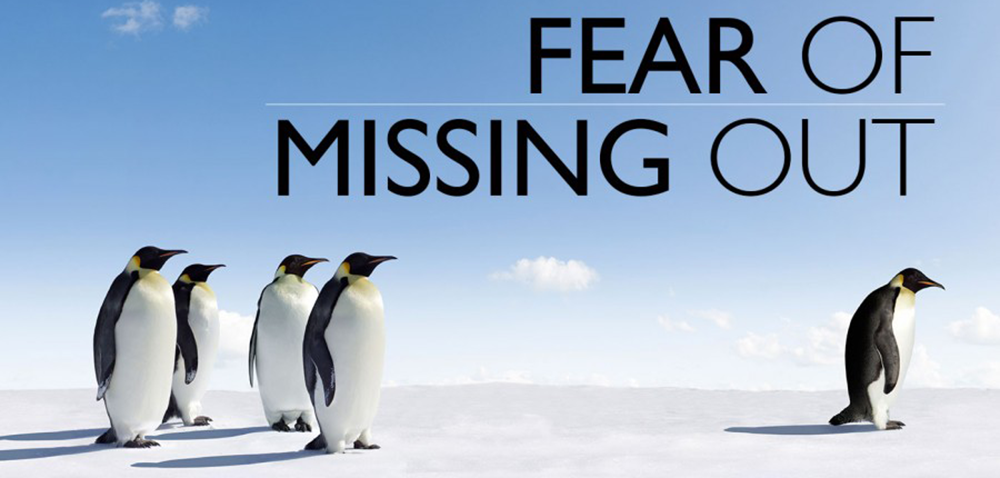
Psychologists began using the term FOMO in the early 2000s to describe a phenomenon associated with the use of social networking sites. Author Patrick.J. Mcginnis coined the term FOMO and popularized it in a 2004 op-ed in The Harbus, the magazine of Harvard Business School. The article was titled McGinnis' Two FOs: Social Theory at Harvard business school.Psychologists have studied FOMO by focusing on how a feeling of “belonging” can influence our self-esteem. In 2013 British psychologists elaborated and defined it as “pervasive apprehension that others might be having rewarding experiences from which one is absent”, FOMO is characterized by the desire to stay continually connected with what others are doing.
FOMO was conceptualized using Self-determination theory (SDT) by Ryan and Deci. In SDT, social relatedness can drive intrinsic motivation, which in turn can encourage positive mental health. Przybylski applied SDT to FOMO, proposing that FOMO is a negative emotional state resulting from unmet social relatedness needs.
According to SDT effective self-regulation and psychological health are based on the satisfaction of three basic psychological needs:
- competence– the capacity to effectively act on the world.
- autonomy – self authorship or personal initiative
- relatedness – closeness or connectedness with others
FOMO is a negative emotional state resulting from unmet social relatedness needs.
FOMO has been defined in scientific literature as involving two specific primary components:
a) apprehension that others are having rewarding experiences from which one is absent
b) the persistent desire to stay connected with people in one’s social network.
The first component maps into the cognitive aspect of anxiety (e.g., worry, rumination, etc.). The latter component involves a behavioural strategy aimed at relieving such anxiety – like how compulsions aim (maladaptively) to relieve anxiety in obsessive compulsive disorder. Currently, this behavioural component of FOMO most often involves frequent checking of Social networking sites and messaging services to maintain social connections and avoid missing out on rewarding experiences.
Research-
Przybylski et al. (2013) took a motivation-based perspective to explain the motivational, emotional, and behavioural correlates of the construct. Adopting self-determination theory, the study argued that FOMO can be explained as a self-regulatory uncertainity deriving from deficits in basic needs satisfaction explained above. The paper developed three studies to test the measurement of FOMO, the relationship between FOMO, demographic and individual difference factors (whether FOMO serves as a mediator factor), and social media engagement.
The results showed that individuals with low efficacy, low autonomy and low relatedness reported higher levels of FOMO, and FOMO was positively related to social media engagement.
They tested a 32-item questionnaire on 672 men and 341 women, most from the United States and India and the rest scattered around the globe and narrowed the questions down to 10 that focused on people's psychological fear of missing out. (A version of the questionnaire is now online at ratemyfomo.com.)
Przybylski said, was that high-FOMO students were more likely to admit to distracted driving habits, including texting or emailing while driving. Fear of missing out likely has to do with people's ability to self-regulate and focus on the moment, he said."For people who feel very secure in their relationships, their relationships are important to them, but they don't feel compelled to always be connected," Przybylski said. Social media may not create the tendency, he said, but it likely exacerbates it by making sharing so easy.
Social media isn’t the devil. But we’re wired to compare ourselves to others and you know where that leads on a medium where everyone is trying so hard to look their best. The online illusion of other people's perceived popularity and busy social calendar can be dangerous when it comes to FOMO, sometimes further isolating us, and prompting negative self-comparison.
Reference-
Przybylski, A. K., Murayama, K., DeHaan, C. R., & Gladwell, V. (2013). Motivational, emotional, and behavioral correlates of fear of missing out. Computers in Human Behavior, 29(4), 1841–1848. https://doi.org/10.1016/j.chb.2013.02.014
Hi ! I am Kanishka a practicing Clinical and Forensic Psychologist .Hope this article was helpful.I provide therapy services to individuals who have been diagnosed with Mental health issues. For more Information do check out the FAQS section of our website. Looking forward to helping you Heal, Nourish and Thrive !
Feel free to reach out to me.
